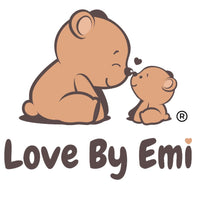You finally manage to set your baby down in the crib. You ninja-roll out of the room, praying to all the parenting gods that the floorboards don’t squeak. And then…
WAILS. Loud, guttural, heartbreaking cries.
It feels personal. Like your baby is accusing you of betrayal. Like you're the worst parent in the world for needing to pee in peace.
But what if I told you that cry? It’s actually a good thing. A healthy thing. A sign that your baby’s little brain is developing exactly as it should.
What’s Really Happening
Between 6 to 12 months old, babies begin to develop object permanence — the understanding that things (and people!) exist even when they’re out of sight. Up until now, if you weren’t in front of them, you were essentially gone forever.
Now? Your baby knows you exist when you walk out the door — they just don’t yet understand when or if you’ll come back.
This developmental leap is huge—but it’s also emotionally overwhelming. Your baby isn’t crying because they’re manipulative or “too clingy.” They’re crying because they miss you, and their nervous system doesn’t yet know how to self-soothe.
What Separation Anxiety Really Means
Separation anxiety is one of the earliest signs of secure attachment. That’s right: the very thing that’s breaking your heart? It’s your baby saying, “You’re my safe person. I need you to feel okay.”
Dr. Daniel Siegel, co-author of The Whole-Brain Child, reminds us that the goal is not to avoid distress but to help our children learn that distress is survivable—with support.
And that begins in moments just like these.
How to Support Your Baby (and Yourself)
Let’s reframe separation from something we “survive” to something we gently guide our children through. Here’s how:
1. Start with small goodbyes.
Practice stepping out of the room for 10–30 seconds and then returning. Narrate it:
“I’m just going to the kitchen. I’ll be right back!”
These small moments build trust that goodbye always leads to return.
2. Use consistent goodbye rituals.
A wave, a kiss, or a simple phrase (“Mama always comes back”) can act as a comfort anchor for your child.
3. Avoid sneaking away.
It may seem easier in the short term, but it sends the message that people can disappear without warning. Predictability builds security.
4. Soothe yourself, too.
You’re not weak for finding this hard. That tug on your heart when your baby cries for you? That’s love doing its job.
A Gentle Reminder
This season of velcro babies and hallway tiptoes won’t last forever. One day they’ll wave goodbye at preschool without a second thought, and you’ll wish for just one more clinging hug.
So if your baby cries when you leave the room, take heart. It means they’ve formed the kind of bond that will shape their lifelong ability to love.
And that’s not just okay — that’s amazing.
